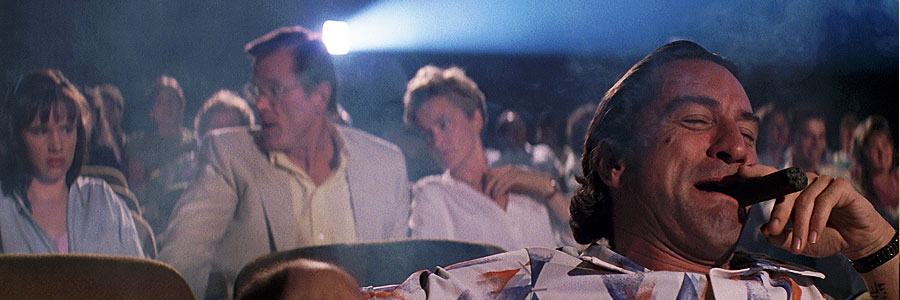
Directed by: Martin Scorsese
Starring: Robert DeNiro, Nick Nolte, Jessica Lange, Juliette Lewis, Robert Mitchum, Joe Don Baker
Martin Scorsese's Cape Fear is a remake of the 1962 film of the same name with some notable plot changes. The original was a more simple tale of good vs. evil. Mitchum's Max Cady tracks Gregory Peck's Sam Bowden because Bowden served as the prosecutor in the case which sent Cady to prison. Scorsese muddies the water by turning Bowden into Cady's defense attorney, whom Cady wants to destroy because Bowden buried crucial evidence that would've likely kept his client out of prison. Cady is a slimy rapist, but Bowden is also guilty because he violated his ethics by failing to provide Cady with an adequate defense. While Cady is indeed evil and nasty, we can still understand his beef with Bowden, who is also depicted as a philanderer who has made life miserable for his wife and daughter. Who to root for? Is there anyone to root for? Or do we all live in a world where good and evil are seen through blurred lenses?
Robert DeNiro plays Cady as an iron-pumping, tattooed redneck who oozes sleaze. His body is littered with tattoos of biblical passages and sayings such as "Vengeance Is Mine". "I don't know whether to look at him or read him," one character quips. He is also a cunning criminal who harasses Bowden and his family by staying on just this side of the law, making it harder for any charges against him to stick. Frustrated by the police's inability to put Cady away, Bowden hires a private eye (Baker) who doesn't mind hiring goons to rough Cady up. Cady survives the beating and continues in his quest to destroy Bowden with a Terminator-like will. It's more than likely that such a beating would put Cady in the hospital for months, but Cape Fear isn't built for realism.
Scorsese is more interested in portraying the blurred lines of ethics and morality. Cady feels entirely justified in his mission because he served fourteen years in prison when evidence could've possibly freed him. Bowden buried the evidence after a bout with his conscience over his client's guilt, so can we entirely blame him? And what of Bowden wife Leigh (Lange) and daughter Danielle (Lewis), who both become unwilling pawns in the battle between Cady and Bowden? Are they somewhat swayed by Cady simply because he is tormenting the man who has cause them both so much grief? Danielle's encounter with Cady at a local high school becomes more of a case of Danielle's excitement over Cady's perverse attention to her.
Cape Fear is at its heart a thriller and it comes to a conclusion aboard a houseboat during a hurricane. It is here where DeNiro's Cady becomes the would-be killer who appears to be dead but keeps coming back, a la Michael Myers. Scorsese seems to get his inspiration here from slasher films and it ends as satisfactorily as it could considering the setup. But Cape Fear doesn't quite measure up to Scorsese's great films, mostly because it is a tweaked remake instead of an original work where Scorsese can truly reflect on his favorite themes of religion, guilt, and violence. But it's still good enough and works better than many thrillers.
No comments:
Post a Comment